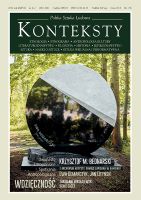Dar Curarrehue. Obserwacje wdzięczności
Gift of Curarrehue. Gratitude observations
Author(s): Magdalena BarbarukSubject(s): Epistemology, Contemporary Philosophy
Published by: Instytut Sztuki Polskiej Akademii Nauk
Keywords: Amereida; travesia; gratitude; observation; Chile;
Summary/Abstract: “The only possible bond with America, the proper form of American love, is gratitude,” said Godofredo Iommi in the lecture Aeneida-Amereida (1981), in which the word la gratitud appears several times, seems to be a key category. In the poem Amereida (1967) gratitude is the condition of freedom. Making gratitude the philosophical foundation of America’s decolonization is astonishing, provocative, and difficult to understand. The text, however, is not solely devoted to the interpretation of the canonical texts of the School of Valparaíso. The author was interested in how gratitude manifests itself in the practices of poetic inhabiting America, i.e. in expeditions into the depths of the continent, the so-called travesía. The article is based on observations made at the turn of November and December during a travesía in Curarrehue (Araucania, Chile) and experiences from a travesía in Cochrane (Patagonia, Chile, 2013) by American doctoral student Doris M. Reina Bravo. The author notes that in both cases, obtaining the status of travesía observer was associated with a special sense of gratitude and fear, which is related to the phenomenon of a gift, but also a transaction. Barbaruk attempted to describe the affect associated with the observation of travesía (field research): the one with which she went to Curarrehue and with which she returned. The overriding framework of her relationship with travesía became the question about gratitude as a research tool, about its impact on the research situation and scientific language. The author suggests that gratitude can be treated as an epistemic virtue.
Journal: Konteksty
- Issue Year: 340/2023
- Issue No: 1-2
- Page Range: 169-177
- Page Count: 11
- Language: Polish

